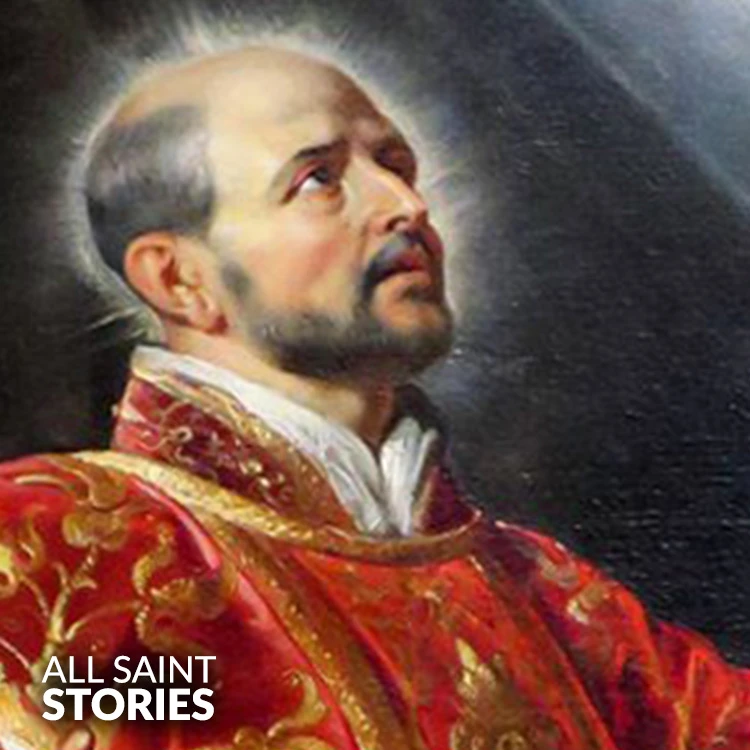"Take, Lord, and receive all my liberty, my memory, my understanding, and my entire will. All that I have and possess, You have given me. I surrender it all to You to be disposed of according to Your will. Give me only Your love and Your grace, for that is enough for me."
ST. IGNATIUS OF LOYOLA
ST. IGNATIUS OF LOYOLA

St. Ignatius of Loyola was a Spanish priest and founder of the Society of Jesus (Jesuits), a major Catholic religious order. Born in 1491, he initially pursued a military career before undergoing a profound spiritual transformation after a battle injury. His subsequent dedication to God led him to develop the influential Spiritual Exercises and found the Jesuits. Ignatius is remembered for his focus on education, missionary work, and spiritual discernment. He was canonized a saint in 1622, and his feast day is celebrated on July 31.
St. Ignatius of Loyola was born in 1491 in the Basque region of Spain into a noble family. His early life was marked by his pursuit of a military career. Ignatius was known for his ambition and fervor for knighthood, yet his life took a dramatic turn when, at the age of 30, he was severely wounded in battle at Pamplona. This injury, which left him bedridden for months, became the turning point in his life.
During his lengthy recovery, Ignatius began reading books on the lives of saints and the life of Christ. His growing spiritual curiosity led to a profound conversion, where he abandoned his military dreams and sought a new path dedicated to God. After his recovery, he spent a period of time in prayer and reflection, notably in a cave near Manresa, where he developed the Spiritual Exercises, a set of meditations designed to help individuals draw closer to God. These exercises focus on prayer, self-examination, and decision-making, aiming to guide the believer toward a deeper relationship with God and more deliberate action in accordance with divine will.
Ignatius’s spiritual journey led him to the University of Paris in 1528, where he met six other men who would later become his first companions in the founding of the Society of Jesus. The group, which included St. Francis Xavier, took religious vows of poverty, chastity, and obedience, forming the foundation of the Jesuit order in 1534. This group of early Jesuits set out to serve God by promoting education, conducting missionary work, and providing spiritual direction. Ignatius emphasized the importance of education in forming leaders who could contribute to the Catholic faith and the global Church.
In 1540, the Society of Jesus was officially recognized by Pope Paul III. The Jesuits quickly became known for their contributions to education, their commitment to missionary work, and their deep spiritual insights. Ignatius’s focus on spiritual discernment, the art of recognizing God’s presence in the world and in one’s own life, continues to shape Jesuit education and spirituality to this day.
St. Ignatius of Loyola was a remarkable spiritual leader, not only because of his personal transformation but also due to the lasting impact of his work. The Jesuits became one of the most influential Catholic orders, known for their devotion to intellectual pursuit, social justice, and religious education. Through the Jesuit network of schools, universities, and missions, Ignatius's teachings spread throughout the world, especially during the Catholic Reformation, which sought to revitalize the Catholic Church in response to the Protestant Reformation.
Ignatius’s writings, especially the Spiritual Exercises, continue to be a central part of Catholic spiritual formation. His approach to spirituality emphasized the importance of finding God in all things, urging believers to recognize divine presence in daily life and actions. His focus on discernment, the process of making thoughtful and prayerful decisions, has inspired millions of Christians worldwide.
Ignatius died on July 31, 1556, at the age of 64. He was canonized a saint by Pope Gregory XV in 1622. His feast day is celebrated on July 31st, the anniversary of his death. Today, the Society of Jesus continues to honor his legacy, running educational institutions, engaging in social justice work, and spreading the teachings of Christ through their various ministries.
Video Not Found
The information on this website is compiled from various trusted sources. While we aim for accuracy, some details may be incomplete or contain discrepancies.
If you notice any errors or have additional information about this saint, please use the form on the left to share your suggestions. Your input helps us improve and maintain reliable content for everyone.
All submissions are reviewed carefully, and your personal details will remain confidential. Thank you for contributing to the accuracy and value of this resource.
Credits & Acknowledgments
- Anudina Visudhar (Malayalam) – Life of Saints for Everyday
by Msgr. Thomas Moothedan, M.A., D.D. - Saint Companions for Each Day
by A. J. M. Mausolfe & J. K. Mausolfe - US Catholic (Faith in Real Life) – Informational articles
- Wikipedia – General reference content and images
- Anastpaul.com – Saint images and reflections
- Pravachaka Sabdam (Malayalam) – Saint-related content and insights
We sincerely thank these authors and platforms for their valuable contributions. If we have unintentionally missed any attribution, please notify us, and we will make the correction promptly.
If you have any suggestion about ST. IGNATIUS OF LOYOLA
Your suggestion will help improve the information about this saint. Your details will not be disclosed anywhere.
© 2026 Copyright @ www.allsaintstories.com





 English
English
 Italian
Italian
 French
French
 Spanish
Spanish
 Malayalam
Malayalam
 Russian
Russian
 Korean
Korean
 Sinhala
Sinhala
 Japanese
Japanese
 Arabic
Arabic
 Portuguese
Portuguese
 Bantu
Bantu
 Greek
Greek
 German
German
 Dutch
Dutch
 Filipino
Filipino